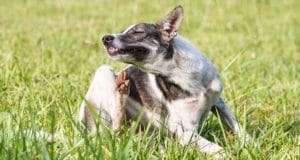I have a border terrier cross, who is virtually bald under his belly and back legs. His skin is black and leathery, and he itches a lot, and chews on top of his paws. His ears tend to swell and we have been given ‘canaural’ to use. We have been told he has an allergy to house dust, and we control his environment as much as possible, but his skin is no better. Is there anything else we could try?
Corinna Waters
Standish, Wigan UK
Read Dr. Kristy Conn’s Advice
Canine atopy is a common disease of dogs where they become sensitized to environmental allergens by producing an excess immune response to the allergen. It is a frustrating disease because there is no real cure but it can be managed. The main clinical signs associated with atopy are those which you have described including pruritus, alopecia, thickening of the skin, licking the top of their paws and chronic ear infections. Since he is allergic to house dust and you have been taking pains to minimize exposure with no improvement then perhaps other allergies are coming into play here. It is common for multiple allergies to be present.
Food allergies cause the same clinical syndrome and if you have not done so already I would recommend a food trial for three months. Select a food with one protein source and one carbohydrate source that your dog has never been exposed to such as lamb and rice and duck and potato. Be sure not to give any treats or rawhide during the food trial. If a food allergy is present you may see improvement in clinical signs after the first four weeks. If clinical signs improve, continue to feed this particular diet however if there is no improvement it is safe to go back to feeding him his regular food.
Another common allergy is flea bite hypersensitivity. A single flea can cause these allergic reactions so treat your dog and his environment for fleas. Monthly spot-on treatments available at your veterinarian are very effective at keeping fleas off your dog but do not neglect the environment as well. Only 10 percent of the total flea population in an infected household will actually be on the dog. The other 90 percent exist as eggs and nymphs in the environment. So treat the environment by washing his bedding, vacuuming and consider use of an indoor treatments such as foggers if you suspect a flea population may be contributing to your dog’s problems.
Supplementation with fish oils can help decrease the amount of immune response to an allergen and may help his coat grow back. A wide variety of supplements containing omega fatty acids are available for dogs promoting skin health. Ask your veterinarian which brands are recommended. Consider using frequent cool baths and hypoallergenic shampoos such as oatmeal shampoos to help remove offending allergens and quiet the skin. If you do not already have one adding an air purifier can help decrease the level of dust in the house and during cleaning keep him away from rooms being cleaned for at least one hour to minimize dust exposure.
Due to the severity of his allergies I believe your best bet would be to find a veterinary dermatologist. They can perform serologic allergy test and intradermal skin testing to see if your dog has other allergies that need to be addressed. Medications such as antihistamines and corticosteroids may be prescribed to break the itch-scratch cycle. He may also benefit from immunotherapy which works by using gradually increasing doses of the offending allergens in order to induce hyposensitization. It doesn’t work in all cases but does provide improvement in 60 to 80 percent of cases so it is something worth checking into.










